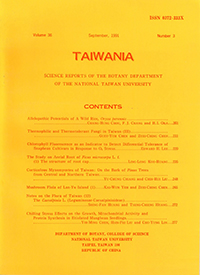Research Paper
Chilling Stress Effects on the Groeth, Mitochondrial Activity and Protein Synthesis in Etiolated Mungbean Seedlings
Yih-Ming Chen, Hsin-Fei Liu, Chu-Yung Lin
Published on: September 1991
Page: 277 - 290
DOI: 10.6165/tai.1991.36.277
Abstract
Mungbean (Vigna radiate L.), a chilling sensitive plant species, was used in this study. Seeds were germinated at 28 C in the dark for 32 H before cold treatment. The seedlings were chilled at 4 C for various durations. Growth, respiration rate, protein synthetic activity, cellular leakages and succinate dehydrogenase activity in isolated mitochondria were then determined. Chilling at r C suppressed seedling growth, increased solute leakages, suppressed succinate dehydrogenase activity in isolated mitochondria, inhibited general protein synthesis and induced the synthesis of a set of proteins termed chilling-induced proteins. The molecular weights of these chilling-induced proteins were110, 88, 78, 69, 58, 48, 38, 14, 12.5 and 10.5Kd were the major chilling-induced proteins of mungbean seedlings. These chilling-induced proteins were different from the heat shock proteins of mungbean seedlings.
中文摘要
本研究此對低溫敏感的植物──綠豆為材料。在黑暗中萌芽32小時的綠豆幼苗,經4C處理不同時間後,分析其生長、粒線體活性及蛋白質合成能力等;其結果顯示下列各種現象接受到抑制:(一)幼苗的生長,(二)粒線體的succinate dehydrogenease活性;(三)幼苗的蛋白質合成能力。但低溫處理會導致幼苗在室溫下呼吸速率增快,且幼苗的組織也受到傷害,因此組織內容直的漏出物增加。在 低溫處理下所合成的35─蛋白質,經SDS─膠體電泳分析及後,其中有13種蛋白質帶是低溫誘導出的蛋白質;其分子量是110, 88, 78, 69, 58, 48, 38, 14, 12.5和10.5KD,其中88, 69, 58, 48, 38, 14, 12.5 and 10.5KD是主要的低溫誘導蛋白質。這些蛋白質完全與綠豆的熱休克蛋白質不同


